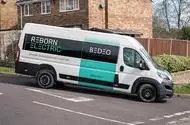Converting diesel vans to hybrid power is a great step, but no governance means wildly varying standards and quality
Who’s going to clean up the donkeys? The big, 3.5-tonne vans and derivatives that do the biggest mileage and stay on the road for the longest amount of time, and often have been fitted with bespoke cargo areas that cost several times over that of the donor van in the first place. Camper vans, ice cream vans, fridge vans, ambulances, supermarket delivery vans and the like.Â
Bedeo, an electric vehicle company based in Farnham, Surrey, would like to lead that cleaning up and believes it is a world leader in retrofitting vans with modern, clean, efficient hybrid drivetrains, with its own proprietary electric motor and battery technology.
Its work is done to OEM standards and it currently has the contract to fit electric powertrains to Stellantis's large electric vans at its plant in Turkey.Â
Bedeo, then, has a very real solution to a very real problem: it can electrify vans already on our roads in a quick and cost-efficient way, significantly reducing emissions for the remainder of that van's substantial life.Â
Yet the word conversion has a bad name in the industry and is a Wild West of varying standards and quality because there remains no legislation or standards governing conversions in the UK for cars or vans, only for buses.Â
Bedeo Group CEO and founder Osman Boyner says it is urgent that this is changed because the prolonged life of vans ('vans' is used throughout here to describe the large, 3.5-tonne vehicles, rather than smaller car-derived vans) means that they'll be on the road and not replaced by electric ones for far longer than the government expects. Boyner points to camper vans as having a 30- to 40-year life as an example.Â
He says: "People are not going to pay three times the price of a diesel van for a new electric one when you have so much invested in the back of a vehicle."
Boyner points to OEM projections that show 3.5-tonne vans will still be about 60-70% diesel-powered when produced new in 2030 across Europe, which means that "the donkeys doing the most work and creating the most pollution" produced then will escape any electrification well into the 2040s and beyond.Â
Don't focus on new vans, when the reality is the ones already on our car parc will be here for a long while yet.Â
According to Boyner, retrofitting hybrid drivetrains is the answer. (In Bedeo's case, it electrifies the rear axle with in-wheel motors and a battery pack in the chassis, so as not to encroach on the cargo area.) Boyner is trying to raise awareness of this solution, which costs around €30,000 (roughly £25,500), substantially less than the cost of a new electric van before any expensive cargo conversion is factored in. The conversion takes no more than a couple of days.
He's being met with silence, not just on legislative standards for retrofitting but also on grants (there are £5000 grants for new electric vans, but not for used conversions, and Boyner sees no distinction given how long the life of a van is) and even the need for the treasury to give permission to change the fuel type of a vehicle registered after 2000.
"When you speak to the government, they say they've laid the strategy and it's net zero," he says. "But how do you achieve that? It's not clear. There is no execution, no next steps.Â
"We say to them: 'You've included buses [in retrofitting standards] but why not vans as well?' Seventy per cent of vans are not sold through OEMs but through a convertor with some kind of job being done on the back. It's more valuable, an asset you own."
Boyner has built up an impressive empire, which includes electric motor company Protean, allowing the firm to create complete electric drivetrains and integrate them into vehicles.Â
Yet he laments the government's disinterest in industry, including that of his own company, and he says that this has deteriorated over the past decade. "There isn't even anyone to lobby, unless you go to the very top."
His words should be ringing in the ears of the government.Â
Boyner says: "[UK chancellor] Jeremy Hunt is the local MP here. He came when we opened and we've asked him to come again but we hardly even get a reply.
"People should be queuing up [from the government] as we have 322 patents, have established a technology company and we ask to be supported because engineering is not cheap and you can't find people.
"It's difficult. Every month we have a discussion among ourselves about whether we should do more in Turkey, or in China. We should not have this discussion. Government should be encouraging bringing the supply chain here, which is mandatory if the UK is to win the war on electric vehicle production.
"We can't get out of China. I don't want to produce in China but we can't get out. It's an addiction to be there, because you buy the products cheaper than in Europe."

